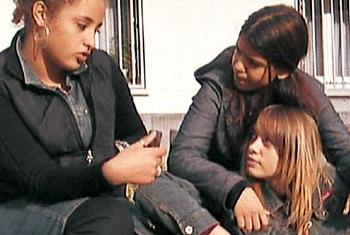Krimo (Osman Elkharraz), a fifteen year old living in an HLM cité outside of Paris, dreams of going around the world on a sailboat with his parents. It’s not for anytime soon though, what with his father being in jail and his mother slaving away in a supermarket… In the meantime, Krimo goes to school, hangs out with his buddies, nothing special. He’s got this on and off girlfriend, too, but lately it’s been mostly off.
His existence brightens up a little in the presence of Lydia (Sara Forestier, a stunningly gorgeous young actress), a childhood friend whom he’s starting to see differently. Maybe it’s the pretty new dress she’s always wearing these days, maybe it’s watching her rehearse for a school play (Marivaux’ Le Jeu de l’amour et du hasard), the point is that Krimo is falling in love. He’s so enamored that he schemes up so that he’s cast as Lydia’s romantic opposite in the play, even though he’s desperately introverted and knows precious little about theatre.
If this was a Hollywood movie, Krimo would reveal unsuspected acting talent, win the girl’s heart, get his dad out of prison and his mom out of poverty and everyone would happily sail into the horizon. But we’re far from Hollywood here; we’re not even close to mainstream French cinema. Abdellatif Kechiche made his film outside the system, with no budget, no professional actors, no fancy equipment and, most importantly, no interest in making a glossy fantasy.
“L’esquive” is a Dogme-like picture, close to the Dardenne brothers’ style (or lack thereof): shaky handheld camera, natural lighting, long seemingly improvised scenes… Such a stripped down approach can grow tedious, unless the people on screen manage to hold our attention on their own, which is the case here. Elkharraz is quietly moving as the frustratingly passive Krimo, who’s unable to act not only on stage but in real life as well. He can’t get out of himself, pretend to be confident or simply enjoy the flirtation. That angered me at first, until I remembered that while it’s easy as an adult to expect people to speak out and stand up for themselves, it can be an impossible task for a teenager all caught up in his insecurities.
Forestier’s Lydia is all the opposite, outwardly at least. She’s loud and expressive, and she gleefully loses herself in Marivaux’ text. What might be problematic is that she remains theatrically dramatic in her relations with others. She’s kind of a tease to Krimo, more or less consciously seducing him then refusing to give him an answer when he asks her out. Around the two leads, Sabrina Ouazani, Hajar Hamlili, Rachid Hami, Nanou Benahmou and Aurélie Ganito are also natural and compelling. You get a real sense that these kids are around each other every day, that they have their own little social play going on, with its marivaudages and colorful language.
Speaking of which, the language used by the characters is one of the film’s most distinctive features. Full of slang and clashing accents, it’s a fascinating dialect backed with generous amounts of unnecessary passion. Everyone’s always in each other’s face, full of attitude and confrontational verbosity. With this kind of often-aggressive dialogue, you’d think it would come to knocks pretty quickly, but it never really does.
That’s quite an extraordinary thing right there. Abdellatif Kechiche shows that life in the cités is not only about drugs and guns. The teenagers portrayed here aren’t delinquents (even though the cops abusively treat them as such); they’re concerned with petty social things and romantic hesitations like teens from anywhere else. We’re used to “ghetto” movies being all about violence, it’s true: until the very end, I still expected someone to get shot, raped or at least beat up! But this isn’t La Haine– it’s more like Raising Victor Vargas, another surprisingly positive-minded film about urban youth.
“L’esquive” recently swept the Césars (the French Oscars), winning for Best Film, Best Director, Best Writing and Most Promising Actress. These awards are mostly deserved, but they create unfair expectations. In reaction, one’s tempted to say that the movie isn’t THAT good… But it is good, very good even! It’s rough around the edges and the lack of a conventional payoff might throw you off a little, but the performances alone make this a must-see.

